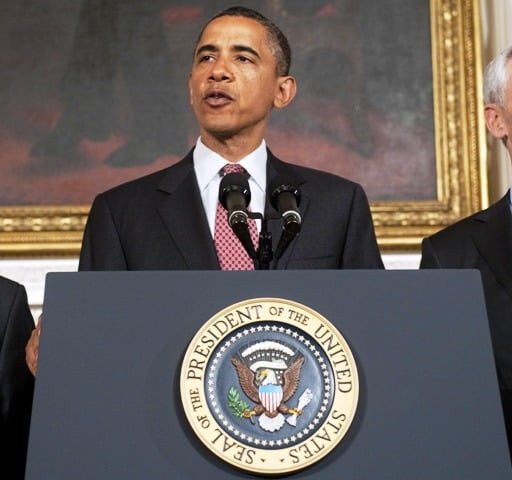Iraq war withdrawal a promise kept for Obama
The distinction between "dumb" and just wars remains an underpinning of the Obama presidency today.

"I don't oppose war in all circumstances ... what I do oppose is a dumb war," Obama said in 2002 in Chicago, a soundbite that would become a strategic benchmark of his campaign and eventually his White House.
Obama likely owes his presidency to his early opposition to the war and Senate votes by his future national foes like Hillary Clinton in favor of a conflict that was supposed to be a cakewalk but which became a quagmire.
When he burst onto the national stage, with a 2004 Senate run, and then an unlikely presidential tilt, Obama's antipathy to the operation in Iraq was a good fit with a public which had turned sharply against the war.
Obama appealed to liberal Democrats as an anti-war crusader. Yet his attitude to military conflict was always nuanced but often ignored.
On Monday, as he met Iraqi Prime Minister Nuri al-Maliki to mark his withdrawal of all US troops from Iraq this month, and a promise kept to end the war, Obama demurred when asked if he still thought the conflict was "dumb."
"I think history will judge the original decision to go into Iraq," he said, though adding that enormous sacrifices by US soldiers and civilians and Iraqis had produced an nation now charting its own destiny.
In retrospect, hints of the Obama who would pursue a relentless drone campaign to assassinate militants in Pakistan and Yemen, despite warnings by rights groups that civilians would also die, were visible in the young candidate.
Opposing war in Iraq, Obama backed it in Afghanistan.
"I would have picked up arms myself to prevent 9/11 again," Obama said on the Charlie Rose show in 2004.
In office, Obama used lethal force, throwing thousands more soldiers into Afghanistan even as he pulled them out of Iraq. He bombed Libya and sent elite forces to train troops hunting rebels in Uganda.
In an act of sang-froid, Obama played nine holes of golf one afternoon in May in the knowledge that special forces troops were tooling up for an operation deep into Pakistan.
Then he returned to the White House Situation Room to watch a risky gambit unfold that killed Al-Qaeda leader Osama bin Laden, and took the sting out of perennial Republican charges that Democrats are security softies.
An image of Obama as steely war leader also emerged in a chilling moment in the White House briefing room last week.
"Ask Osama bin Laden and the 22 out of 30 top Al-Qaeda leaders who've been taken off the field whether I engage in appeasement," he said coldly, when asked to comment on Republican critiques of his security policy.
Obama has also examined the costs of war, somberly watching the remains of fallen soldiers and covert operatives brought home.
The distinction between "dumb" and just wars remains an underpinning of the Obama presidency today.
In Oslo in 2009, Obama accepted his Nobel Peace Prize by delivering a treatise on the use of war.
"I am the commander-in-chief of the military of a nation in the midst of two wars," said Obama. "
"I face the world as it is, and cannot stand idle in the face of threats to the American people," Obama said.
Obama also foreshadowed reasoning that would lead him to commit US firepower to shield Libyan civilians from what he said was a looming massacre by former strongman Moamer Kadhafi this year.
"We all confront difficult questions about how to prevent the slaughter of civilians by their own government, or to stop a civil war whose violence and suffering can engulf an entire region," Obama said.
While Obama's campaign aides will likely highlight his national security judgment in the campaign for a second term next year, it has not always been infallible.
In 2008, then senator Obama misjudged the troop surge strategy in Iraq pursued by president George W. Bush -- saying it could make things worse.
And his critics hounded him for timidity, and for "leading from behind" when Obama's concept of burden sharing in war led him to allow British and French forces to shoulder most direct combat in Libya after the initial US onslaught.



















COMMENTS
Comments are moderated and generally will be posted if they are on-topic and not abusive.
For more information, please see our Comments FAQ